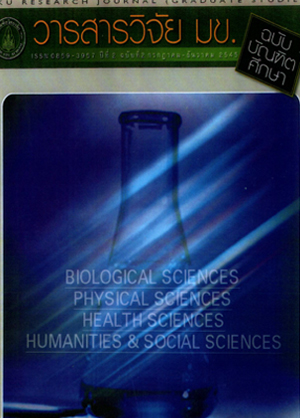Psycho-Situational Correlates of Self-Care Behavior of The Nurses in Kalasin Hospital (จิตลักษณะและปัจจัยสถานการณ์ที่เกี่ยวข้องกับพฤติกรรมการดูแลสุขภาพตนเองของ พยาบาล โรงพยาบาลกาฬสินธุ์)
Keywords:
Psychological characteristics, Situational factors, self-care behaviorAbstract
The purpose of the present research was to study the correlation between situational factors, psychological traits and psychological states on the self-care behavior of the nurses on the other, and to study significant predictive variables of situational and psycho-characteristic factors concerning self -care behavior of the nurse.
The findings:
1. The 6 variables of psycho-social indicators correlated with self -care behavior in the way that the nurses with high level of situational factors such as receiving strong social support on health from family and friend s displayed a high level of psychological traits factors, i.e. high levels of future orientation and self-control and Buddhist practice. They also possessed a high level of psychological states factors such as a good attitude towards self-care and a high level of internal locus of control in health. This group of nurses showed a higher level of self -care behavior than those who possessed lower level of such variables.
2. The significant predictive for self-care behavior of the nurse included Buddhist practice, good attitude towards self -care, future orientation and self-control, and receiving strong social support on health from friend s. The variables could predict for 34.8% of the whole sample group, while the group with longer length of service had the highest prediction percentage or 54.2% The significant predictive variables for this group included social support on health from family, Buddhist practice, future orientation and self -control, and internal locus of control in health.
การวิจัยครั้งนี้ มีวัตถุประสงค์เพื่อการศึกษาความสัมพันธ์ระหว่างปัจจัยสถานการณ์ ปัจจัยจิตลักษณะเดิม และปัจจัยจิตลักษณะตามสถานการณ์ กับพฤติกรรมการดูแลสุขภาพตนเองของพยาบาล และศึกษาตัวแปรทำนานสำคัญของพฤติกรรมการดูแลสุขภาพตนเองของพยาบาล จากปัจจัยสถานการณ์ และปัจจัยจิตลักษณะ
ผลการวิจัย :
- ตัวบ่งชี้ทางจิตสังคมทั้ง 6 ตัวแปร เกี่ยวข้องกับพฤติกรรมการดูแลสุขภาพตนเอง ดังนี้ พยาบาลกลุ่มที่มีปัจจัยสถานการณ์ในระดับสูง คือ ได้รับการสนับสนุนด้านสุขภาพจากครอบครัวสูง และได้รับการสนับสนุนด้านสุขภาพจากเพื่อนสูง มีปัจจัยจิตลักษณะเดิมในระดับสูง คือ มีลักษณะมุ่งอนาคตและควบคุมตนเองสูง และมีความเชื่ออำนาจภายในตนด้านสุขภาพสูง จะมีพฤติกรรมการดูแลสุขภาพตนเองสูงกว่ากลุ่มที่มีปัจจัยดังกล่าวต่ำ



